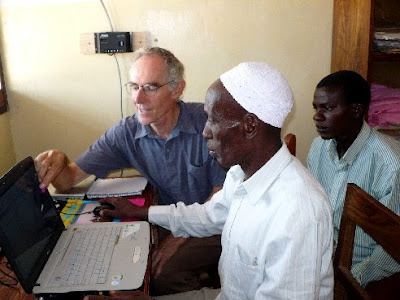Keith and Christine would love to hear from you with questions, comments, personal news and any news at all from
Maria gave us our chapatis early so that we could be at school early – the tasks we had undertaken were seemingly immense for the time we had left. Mr Edson was writing notes on evaporation and condensation on the board but withdrew under the force of Madam Simbee’s argument that we had planned a session. I felt a bit like a lesson bully, but he assured me that it was quite all right. The students have said that science equipment is something that they don’t have and so most of their lessons deal with theory and don’t have accompanying experiments.
With photo projects to start for the form twos today, we had decided to leave the camera for the form ones and work on English skills using a game format. After a very brief re-run of the introduction to me and my life in Australia, and some very perceptive questions that reminded me that there were students in their later teens in this class, we began. Madam Josephine was there too. 

Morning tea was ground nuts and delicious little cakes that were moist and dense and not too sweet. The Farkwa weight loss that Rosie had promised me due to inevitable sickness had not eventuated, and Madam Simbee was daily working against it. The next session was with form two C & D – 57 students – and involved them writing a few sentences to go with photos of themselves, in a slide show project that introduced the class members. It was quite a challenge to correct writing, supervise photos, and maintain a list of names in the order that the photos were taken, and it was a good thing that there were two of us to do it.
Keith spent the morning with more computer tutorials with teaching staff, taking one or two at a time, whenever they had no teaching commitments.
Frank was not so easy to understand, but was very welcoming and sat us down for a talk. When Keith asked about projects, Edward explained the range and Keith selected sustainability to hear more about. It was very interesting to hear that ‘sustainability’ was not being used in the environmental context that we are so familiar with in Australia, but rather in the sense that support is given to projects that can perpetuate themselves and grow, to the benefit of the wider community without the permanent support of World Vision. Thus, no money was given, only materials and support to groups who are setting up businesses. These Community-Based Organisations (CBOs) need to be cooperative efforts, which make the most of the practical benefits of working together, and so that if one person leaves, expertise and commitment is not lost. The next step is for well functioning CBOs to join together to form locally based groups which are able to access regional loans from the government. It tied in with what had been said at the political meeting on Saturday.
We met six or seven workers in a shared office, with those in charge of sponsor children having huge piles of files in front of them. The Farkwa office is one of the three main offices in
Aid projects can be viewed quite differently by donors, recipients and observers of that aid. One man was very pally with us, and said immediately that we were his Australian mother and father. This is a cultural difference that some of the sponsors have found difficult to understand in letters. Students have referred to sponsors as their parents, have asked for large gifts like bicycles and sometimes have asked when they can come to
Frank escorted us home, and I spent quite a while typing up the form two introductions on the front step, with the dogs flaked out in the shade and the ever busy chooks on the lookout for food.
Eventually Rosie returned for bed, having had a ‘once in a blue moon’ night out, if only to the fireside, and she was happy to have had that time with Ticha in the heart of the family.
Many of the trees in Tanzania are deciduous. They lose their leaves in the dry season to reduce moisture loss. They look dead now but by December they will be covered in new leaves.



No comments:
Post a Comment